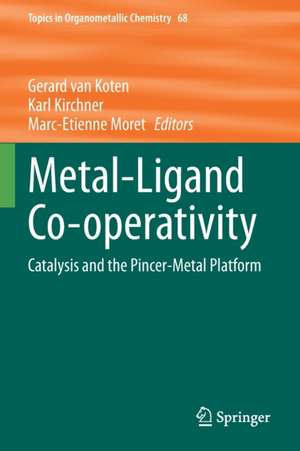Metal-Ligand Co-operativity: Catalysis and the Pincer-Metal Platform: Topics in Organometallic Chemistry, cartea 68
Editat de Gerard van Koten, Karl Kirchner, Marc-Etienne Moreten Limba Engleză Paperback – 31 mar 2022
| Toate formatele și edițiile | Preț | Express |
|---|---|---|
| Paperback (1) | 2095.98 lei 6-8 săpt. | |
| Springer International Publishing – 31 mar 2022 | 2095.98 lei 6-8 săpt. | |
| Hardback (1) | 2102.13 lei 6-8 săpt. | |
| Springer International Publishing – 30 mar 2021 | 2102.13 lei 6-8 săpt. |
Din seria Topics in Organometallic Chemistry
-
 Preț: 764.59 lei
Preț: 764.59 lei - 18%
 Preț: 1660.02 lei
Preț: 1660.02 lei - 15%
 Preț: 637.78 lei
Preț: 637.78 lei - 18%
 Preț: 1215.70 lei
Preț: 1215.70 lei - 18%
 Preț: 1824.95 lei
Preț: 1824.95 lei - 18%
 Preț: 1821.03 lei
Preț: 1821.03 lei - 18%
 Preț: 1826.37 lei
Preț: 1826.37 lei - 18%
 Preț: 1824.19 lei
Preț: 1824.19 lei - 18%
 Preț: 1822.76 lei
Preț: 1822.76 lei - 18%
 Preț: 1822.26 lei
Preț: 1822.26 lei - 18%
 Preț: 1219.94 lei
Preț: 1219.94 lei - 18%
 Preț: 1823.39 lei
Preț: 1823.39 lei - 18%
 Preț: 1824.64 lei
Preț: 1824.64 lei - 18%
 Preț: 1823.20 lei
Preț: 1823.20 lei - 18%
 Preț: 1218.38 lei
Preț: 1218.38 lei - 18%
 Preț: 1820.22 lei
Preț: 1820.22 lei - 18%
 Preț: 1221.51 lei
Preț: 1221.51 lei - 18%
 Preț: 1219.63 lei
Preț: 1219.63 lei - 18%
 Preț: 1813.26 lei
Preț: 1813.26 lei - 18%
 Preț: 1208.92 lei
Preț: 1208.92 lei - 18%
 Preț: 1823.39 lei
Preț: 1823.39 lei - 18%
 Preț: 1811.69 lei
Preț: 1811.69 lei - 18%
 Preț: 1214.27 lei
Preț: 1214.27 lei - 18%
 Preț: 1813.92 lei
Preț: 1813.92 lei - 18%
 Preț: 1821.51 lei
Preț: 1821.51 lei - 18%
 Preț: 1814.73 lei
Preț: 1814.73 lei - 18%
 Preț: 1216.48 lei
Preț: 1216.48 lei
Preț: 2095.98 lei
Preț vechi: 2556.07 lei
-18% Nou
Puncte Express: 3144
Preț estimativ în valută:
401.06€ • 418.74$ • 331.93£
401.06€ • 418.74$ • 331.93£
Carte tipărită la comandă
Livrare economică 04-18 aprilie
Preluare comenzi: 021 569.72.76
Specificații
ISBN-13: 9783030689186
ISBN-10: 3030689182
Ilustrații: X, 451 p. 170 illus., 144 illus. in color.
Dimensiuni: 155 x 235 mm
Greutate: 0.64 kg
Ediția:1st ed. 2021
Editura: Springer International Publishing
Colecția Springer
Seria Topics in Organometallic Chemistry
Locul publicării:Cham, Switzerland
ISBN-10: 3030689182
Ilustrații: X, 451 p. 170 illus., 144 illus. in color.
Dimensiuni: 155 x 235 mm
Greutate: 0.64 kg
Ediția:1st ed. 2021
Editura: Springer International Publishing
Colecția Springer
Seria Topics in Organometallic Chemistry
Locul publicării:Cham, Switzerland
Cuprins
Recent Advances in the Applications of Metal-Ligand Cooperation via Dearomatization and Aromatization of Pincer Complexes.- Metal-Ligand Cooperation at Acceptor Pincer ligands.- Metal-Ligand Cooperativity of Phosphorus Containing Pincer Systems.- Cooperative Reactivity by Pincer-type Complexes Possessing Secondary Coordination Sphere.- Redox-Active Pincer Ligands.- A Pincer Motif Etched into a meta-Benziporphyrin Frame.- The role of Metal-Ligand Cooperation in Manganese(I)-catalyzed Hydrogenation/Dehydrogenation Reactions.- Hydrogenation Reactions Catalyzed by PNP-Type Complexes featuring a HN(CH2CH2PR2)2 Ligand.- Catalytic Conversion of Nitriles by Metal Pincer Complexes.- The Application of Pincer Ligand in Catalytic Water Splitting.
Notă biografică
Gerard van Koten is emeritus distinguished professor at Utrecht University. He has been involved in the early development of organometallics with the pincer platform with the NCN-bonding motive (first 1976), PCP and SCS. He explored their use as homogeneous catalysts either as such or immobilized on dendrimers (1994) or covalently attached to enzymes (2005), as sensoring materials (SO2 (2000) or I2 (1986)), and as photoactive materials (2000). Particular interest has been directed to study (reversible) C-C bond formation and bond cleavage (1978) processes on the pincer-metal platform.
Karl Kirchner is presently Professor of Organometallic Chemistry at the Technical University of Vienna (TU Wien). His expertise is centered around the theme ligand design, synthesis of well-defined non-precious transition metal complexes and their applications in homogeneous catalysis. He obtained his PhD in 1987 from TU Wien with Prof. R. Schmid. After two postdoctoralstays at Washington State University with Prof. J. P. Hunt (1988, 1989) and Nobel laurate Prof. H. Taube at Stanford University (1990), he returned to TU Wien completing his Habilitation in 1994.
Marc-Etienne Moret obtained a PhD degree from the Eidgenössische Technische Hochschule Zürich (ETHZ) with Prof. P. Chen in 2009. In 2010, he moved to the California Institute of Technology (Caltech) for postdoctoral research in the group of Prof. J. C. Peters on the activation of N2 by synthetic iron complexes. Since 2012, he is assistant professor in the group of Organic Chemistry and Catalysis at Utrecht University (UU). His research interests revolve around the design of novel ligands for small-molecule activation and catalysis using first-row transition metals.
Textul de pe ultima copertă
This book provides researchers in the fields of organic chemistry, organometallic chemistry and homogeneous catalysis with an overview of significant recent developments in the area of metal-ligand cooperativity, with a focus on pincer architectures. The various contributions highlight the widespread impact of M–L co-operativity phenomena on modern organometallic chemistry and catalyst development. The development of efficient and selective catalytic transformations relies on the understanding and fine control of the various elementary reactions that constitutes a catalytic cycle. Co-operative ligands, which actively participate in bond making and bond breaking together to the metal they support, open up new avenues in this area. In particular, buttressing a weak or reactive metal-ligand bond by flanking coordinating arms in a pincer ligand design is proving a versatile strategy to access robust metal complexes that exhibit unusual and selective reactivity patterns.
Caracteristici
Presents an overview of recent developments in M–L cooperativity phenomena Highlights the importance of this field on catalyst development and applications Contributions from leading international experts in the field
